Discover The Good Enough Mother
The Good Enough Mother

The Good Enough Mother
Author: Dr Sophie Brock
Subscribed: 333Played: 9,223Subscribe
Share
© All rights reserved
Description
The role of being a Mother offers us the potential for incredible expansion, growth, and power, while also being one of – if not THE – most challenging, undervalued, and taken for granted roles in the world. Motherhood Studies Sociologist, researcher, and single Mother, Dr Sophie Brock hosts The Good Enough Mother (TGEM) podcast with an aim to change how Motherhood is culturally defined and individually experienced. TGEM draws its name from a theorist and pediatrician Winnicott, who highlighted the ways ‘good enough’ parenting is actually what is best for our children – not perfectionism. The podcast centres the Mother as the starting point for conversations with experts and change-makers who are passionate about seeing social, cultural, and institutional change to better support Mothers and therefore our families, and communities.
124 Episodes
Reverse
What happens when the emotional, hormonal, and cultural shifts of perimenopause intersect with the daily realities of motherhood? In this episode, I’m joined by Dr Cristina Cavezza - clinical psychologist, certified Motherhood Studies practitioner, and mother of twins - for a powerful conversation on the complexities of midlife mothering.
Cristina shares her clinical and lived experience of working with mothers during the menopausal transition, exploring how body image, eating habits, and emotional wellbeing are shaped by both personal history and broader systems of power. We talk about the role of objectification theory, the impact of internalised shame and societal shoulds, and the importance of approaching our inner worlds with compassion and curiosity.
Cristina brings a trauma-informed, feminist lens to her work - blending schema therapy, EMDR, and therapeutic re-parenting to support women in understanding their emotional needs and reclaiming a more connected relationship with food, their bodies, and themselves.
She also offers a beautiful reminder about the importance of play - not just for our children, but for us too.
CONNECT WITH DR. CRISTINA CAVEZZA
📍 Instagram: https://www.instagram.com/dr_cristina_cavezza/?hl=en
📘 Facebook: https://www.facebook.com/profile.php?id=61573518659491
💼 LinkedIn: https://www.linkedin.com/in/dr-cristina-cavezza-222441209/
In this episode I’m joined by Jessica Tomich Sorci, LMFT - a Level 3 Certified Internal Family Systems (IFS) Therapist, Certified Perinatal Mental Health Professional, and the creator of “Mom Parts.” Jessica brings decades of experience in maternal mental health and introduces us to the profound concept of parts work within the context of motherhood. We explore how IFS offers a radically compassionate lens through which to understand maternal distress, not as pathology, but as a protective and adaptive system.
Jessica shares how her own postpartum years “blasted apart her psychological infrastructure,” and how discovering IFS brought the structure and depth she needed, both personally and professionally. We talk about her groundbreaking book When Good Moms Feel Bad (forthcoming in 2026 from Hachette Balance), which helps mothers reconnect with their inner wisdom through compassion, creativity, and curiosity. From rage and reactivity to grief, shame, and intergenerational wounds, this conversation holds space for the full range of the emotional experiences of mothers.
Connect with Jessica:
🌿 Website: https://www.instagram.com/jessicatomichsorci/
🌿 Instagram: https://www.instagram.com/jessicatomichsorci
🌿 Facebook: https://www.facebook.com/jessica.sorci.14
I explore the emotional complexity that motherhood brings in the context of post-Mother’s-Day – and how we can feel both deep love and deep exhaustion, often in the same breath.
I speak to the invisible labour mothers carry, the craving to be seen, and the cultural expectations that shape how we think we “should” feel.
You'll hear some of my own reflections about ambivalence, overwhelm, tenderness, identity, and what it means to take up space as a mother.
.
.
.
If this conversation resonates with you and you're curious about what it looks like to bring this lens into your current or future mother-care work, tune in to the previous episode: Ep 121 - A Free Training + A Final Invitation: The Next Wave of Motherhood Studies. I share details about the free Missing Piece training and the final days to join The Motherhood Studies Certification - https://drsophiebrock.com/motherhoodstudies
Join us for a groundbreaking conversation with Professor Andrea O'Reilly, the internationally renowned pioneer who founded the field of Motherhood Studies. In this powerful episode, Dr O'Reilly shares her 40-year journey from questioning motherhood's absence in Women's Studies as a pregnant undergraduate to establishing an entire academic discipline dedicated to mothers' experiences. She discusses the creation of the Journal of the Motherhood Initiative, Demeter Press (which has published nearly 200 titles), and concepts like "Mother Outlaws" and Matricentric Feminism. Key themes explored include the difference between patriarchal motherhood and empowered mothering, the ongoing struggle for legitimacy in academia, raising "outlaw children" against patriarchal norms, the vital importance of community for resistant mothers, and her vision for making mothers "the before thought, not the afterthought." Andrea reflects on the costs and joys of feminist mothering, the need for a mother-centered lens in all disciplines, and why mothers need their own feminism. This episode is essential listening for anyone interested in understanding how motherhood shapes our world and how we can create more supportive spaces for all mothers.
Demeter Press Website: https://demeterpress.org/
In (M)otherwords (Prof O’Reilly’s essays) book: https://demeterpress.org/books/motherwords
The Mother Wave collection: https://demeterpress.org/books/the-mother-wave
Journal of the Motherhood Initiative, open access: https://jarm.journals.yorku.ca/index.php/jarm
For those inspired to dive deeper into this field, you can be trained in the sociology of motherhood through the Motherhood Studies Certification. The next wave of this certification has been directly inspired by my chapter in "The Mother Wave" book, helping to contribute to Dr O'Reilly's ground-breaking work, and turning Motherhood Studies concepts into practical application for professionals working with mothers - https://drsophiebrock.com/motherhoodstudies
Listen to free training on The Missing Piece in Mother-Care Work here: https://motherhoodstudies.newzenler.com/courses/the-missing-piece-in-mother-care-work/buy?coupon=missingpiecefree
Content note: perinatal suicidality
In this episode Sophie speaks with midwife and Research Fellow Dr Laura Biggs, and CEO of PANDA Australia, Julie Borninkhof about the Making Sense of the Unseen partnership between the Stronger Futures CRE and the Murdoch Children’s REsearch Institute, PANDA Perinatal Anxiety and Depression Australia, and James Cook University.
In the episode you’ll hear discussed key findings from ground-breaking research conducted by the team on experiences of perinatal suicidality, the first study of its kind ever to be carried out. Suicide is the leading cause of maternal death in Australia and other high-income countries and yet so far, we’ve known little about women’s experiences of suicidality at this time in their lives. As discussed in this episode, the research identified that perinatal suicidality is driven by experiences of shame, and feelings of being disconnected and ‘defective’ as a mother.
We talk about how societal pressures and the perfect mother myth narrative profoundly impact women’s mental health, and share stories from the research that demonstrate the profound importance of compassionate care and rehumanising relationships and care experiences for mothers. This episode is an especially important listen for all of those who work in healthcare and/or with mothers.
We want to acknowledge the 139 women who shared their experiences of perinatal suicidality with the research team, as without their generosity, this research and this conversation on the podcast sharing these important findings would not be possible.
…
Episode webpage: https://drsophiebrock.com/podcast119
Connect with Laura on Twitter @l_biggs
Follow PANDA on Facebook at facebook.com/pandanational and Instagram @pandanational
Laura Biggs’ email: laura.biggs@mcri.edu.au
Learn more about Making Sense of the Unseen: https://www.strongerfutures.org.au/making-sense-of-the-unseen
Read the journal article: https://journals.sagepub.com/doi/full/10.1177/10497323231164278
Support lines
Australia - www.panda.org.au/ - 1300 726 306
@pandanational @lifelineaustralia @13yarn
UK - pandasfoundation.org.uk/ - 0808 1961 776
USA - www.postpartum.net/ - Text “Help” to 800-944-4773 (EN)
The EU/EEA - Mental health helpline - 116 123
I share some updates and some talks I’m giving soon, along with the recording I took of when I was practicing my talk for the Matrescence Festival, organised by Claire Tonti and Lizzy Humber. In the talk I share about where the ‘perfect mother myth’ often starts in our own lives, what it is, how it connects to the broader ‘tank’ of motherhood that we’re all ‘swimming’ around in, and how mothering can be a catalyst for our own growth and development. Here are the links mentioned in the episode -
Parental Brain Summit - presenting on “Understanding the Care Career Conundrum: A Sociological Approach for Professionals" - https://info137--newbornparents.thrivecart.com/the-parental-brain-summit/
Breastfeeding Conference (May 9, 2025) presenting on "Beyond 'Good Mothers' and 'Good Babies': Sociological Insights on Cultural Ideals"
https://www.breastfeedingconferences.com.au/about/Broken-Sleep-Insights-and-evidence-based-approaches-to-infant-sleep?ref=XARAHE
Publications - Journal of Motherhood Initiative - 25th Anniversary Issue
https://jarm.journals.yorku.ca/index.php/jarm/issue/view/2324
https://jarm.journals.yorku.ca/index.php/jarm/issue/view/2324#:~:text=Maternal%20Legacies,Marie%20Porter%2C%20AM
The Mother Wave - https://demeterpress.org/books/the-mother-wave-theorizing-enacting-and-representing-matricentric-feminism/
The Next Wave of The Motherhood Studies Certification - https://drsophiebrock.com/motherhoodstudies email info@drsophiebrock.com ‘enrolment’ if you’re interested in enrolling and would like the enrolment link
In this episode, I speak with mother of two and writer Tehla Bower about her book, "A Mother's Space: Permission to Pause." Tehla candidly shares her experience of disconnection after becoming a mother and her journey to shed both external and internal expectations, ultimately drawing on her maternal experience to reclaim space and redefine herself. She describes pivotal health events affecting her and her children that prompted a significant life shift. Tehla reflects on her formerly career-centric identity and how motherhood surprisingly reconnected her with forgotten parts of herself. We discuss societal judgment of mothers, including the dismissive "what a waste" comment she received while pregnant after completing her MBA, and examine how institutions reinforce oppressive structures impacting mothers. Tehla's story illustrates how mothers live within the 'tank,' subject to rules, expectations, and judgment, but can learn to 'mother against motherhood' (O'Reilly; Rich) and reclaim a space of their own. Learn more about Tehla and get your copy of “A Mother’s Space” here – www.tehlajane.com
https://www.instagram.com/tehla_jane/
https://www.facebook.com/tehla.jane/
In this episode with leadership facilitator and founder of Matermorphosis, Babette Lockefeer, we explore the powerful intersection of motherhood and leadership. Drawing from her experience in corporate leadership development and as a mother of three young boys, Babette shares her journey of discovering how matrescence mirrors the path of authentic leadership. The conversation explores how the changes that come with becoming a mother can create unique opportunities for growth and learning, and we discuss the importance of reclaiming our role as mothers as an asset rather than a liability in professional spaces. Babette reflects on the power of mothering as a catalyst for transformation in both our personal and professional lives.
Connect with Babette:
LinkedIn: https://www.linkedin.com/in/babette-l-85693326
Babette's leadership development company: https://www.theoryy.org/
Instagram: https://www.instagram.com/matermorphosis/
Resonated with Babette's 'mountains' analogy from the episode? Check out her program - The Mother Mountain: https://www.matermorphosis.org/
.
.
.
Ready to transform how you support mothers in paid work through their biggest challenges? Join Dr Sophie's professional development training - Mothers at Work - a program that equips coaches, consultants, and leaders with evidence-based sociological frameworks and practical tools to help mothers navigate guilt, the mental load, and workplace challenges while building lasting confidence in both their careers and mothering journeys. https://drsophiebrock.com/mothersatwork
Use coupon code - podcastmothersatwork - for a 10% discount. Coupon code valid until Feb 7th 2025
Julia Jones has over 15 years of experience as a postpartum doula, educator, and best-selling author and has trained over 1500 postpartum professionals in over 60 countries through her worldwide leading education training for postpartum professionals. In this episode Julia shares about her entry into the space of postpartum support, differences in postpartum support practices around the world, and the development of her long-term vision in revolutionising postpartum care practices through Newborn Mothers. Julia’s initial interest in ayurvedic practices led her down the path of offering postpartum care, but there was a lack of formal training options when she started 15 years ago. Julia shares her journey in filling this gap through her business and community. We talk about boundaries, working from data rather than assumptions, and making intentional choices. We discuss the professionalisation of postpartum care and hear Julia’s vision of a world where postpartum care is understood as integral to the health and wellbeing of families, and postpartum care professionals are given the recognition, support and respect that they deserve.
Connect with Julia:
Website: https://newbornmothers.com/
Postpartum Education and Care Professional Training: https://newbornmothers.com/training
Facebook: https://www.facebook.com/NewbornMothers
Instagram: https://www.instagram.com/newbornmothers/
.....
If you work in mother-care and have trained in any of Dr Sophie's professional development programs or would like to, check out her upcoming in-person event: Evolve 2025 on Saturday February 22nd: https://drsophiebrock.com/evolve2025
In this solo episode, I share the story of how an accidental footnote in my sociology degree led me to discover my life's work and create the world's first Motherhood Studies Practitioner Certification. Before its evolution in 2025, I'm offering this Legacy Edition of the certification with its foundational curriculum one final time - and at a $1,000AUD discount. In this episode I share what I'm doing differently next year, my thoughts on the current and future landscape of mother-support, and what makes this Legacy Edition special.
Note: The Legacy Edition special offer is closing soon. The program is in complete self-study mode to complete at your own pace, is discounted by $1,000AUD, and is available on a 12 month payment plan. If you want to be part of creating real change in how we value and support mothers, this is for you. Learn more and join here: https://drsophiebrock.com/motherhoodstudies/
Resources Mentioned:
The Fish Tank of Motherhood animation - https://drsophiebrock.com/thefishtankofmotherhood
Graduate stories and transformations - https://drsophiebrock.com/clientfeedback
Legacy Edition enrollment details - https://motherhoodstudies.newzenler.com/courses/legacyedition/buy/plan/150974
In this episode, I have a personal and powerful conversation with Suzy Reading, a mother of two, an author, Chartered Psychologist and Coach. Suzy shares her profound journey of becoming a mother while simultaneously losing her father, exploring how this experience shaped her understanding of "energetic bankruptcy" and the vital importance of self-care. Through her story of navigating new motherhood amidst grief and challenge, Suzy challenges cultural narratives around motherhood that demand endless sacrifice. She offers gentle yet powerful insights about the incomplete nature of kindness when it doesn't include ourselves, and provides practical wisdom for anyone navigating loss, change, or the demanding journey of motherhood. Suzy is the Psychology Expert for wellbeing brand Neom Organics and is a founding member of the ‘Nourish’ app. She figure-skated her way through her childhood, growing up on the Northern Beaches of Sydney, and now makes her home in the hills of Hertfordshire, UK.
Connect more with Suzy’s work and grab a copy of her latest book, Self-Care for Winter.
Website: www.suzyreading.co.uk
Instagram: https://www.instagram.com/suzyreading/
Facebook: https://www.facebook.com/SuzyReadingPsychologyAndYoga/
Twitter: @SuzyReading
.
.
.
Doors are now open for The Motherhood Studies Practitioner Certification: Legacy Edition. Including lifetime access to the full classic curriculum, which has provided the cornerstone for Motherhood Studies professional development and continuing education for practitioners, professionals and business owners worldwide. Also included is a bonus module packed full of resources for you to use in your mother-supporting work, equipping you with templates, worksheets, speaker documents, client-facing materials and other resources.
The Certification is discounted by $1,000AUD for a limited time only. Learn more here: https://drsophiebrock.com/motherhoodstudies/
.
.
.
*Language warning for this episode
In this episode, we're joined by Amanda Montei, the author of "TOUCHED OUT: Motherhood, Misogyny, Consent, & Control."
Amanda's work, which spans from The New York Times to ELLE, brings a critical eye to the experiences of motherhood under the weight of societal expectations.
We talk about the line between the institution of motherhood and our experience of mothering, referencing back to Adrienne Rich’s work and trace some of Amanda’s experience of mothering as transformational, creative, and even radicalizing. Amanda’s work explores the body and consent, and the ways in which parenting is not just an arena where we may pass on beliefs about our bodies, but also for learning about them.
Motherhood as an area for self-inquiry and discovery, as well as social and political activism and exploration, is something we discuss - moving between both the broader social and cultural institution and intimate lived experience. Amanda shares her insights on boundaries, good girl conditioning, consent, maternal ambivalence and maternal identity, and motherhood as a source of both constraint and power.
Tune in to explore how motherhood can serve as both a refuge and a form of rebellion, reshaping identity and challenging societal norms. Follow Amanda's ongoing exploration of motherhood on Instagram: https://www.instagram.com/amontei/ or read a copy of her book https://www.amazon.com.au/Touched-Out-Motherhood-Misogyny-Consent/dp/0807013277 or subscribe to her newsletter https://amandamontei.substack.com/
*Download your free checklist here: https://drsophiebrock.com/checklist
*The Mothers at Work program starts August 26th, 2024. Learn more here: https://drsophiebrock.com/mothersatwork
What is the Care Career Conundrum, and how does it impact mothers in paid work? How can understanding this concept transform our approach to supporting mothers?
Download a free tool I've developed called The Care Care Career Conundrum Checklist and see how many indicators you or your clients tick off.
This checklist is part of my broader Mothers at Work program, a 5 week Training program for coaches, facilitators, consultants and leaders to drive change for working mothers.
In this episode you'll learn about the social construction of motherhood and the 'fish tank' analogy, the perfect mother myth and its impact on 'working mothers', a reflection on the language we use to describe mothers in paid work, and what the Care Career Conundrum is.
In this conversation, I speak with digital creator, speaker and mental health advocate Libby Ward from Diary of an Honest Mom, whose work has touched millions of women worldwide. I ask Libby about her journey and we talk candidly about some of the challenges that come up in opening honest conversations about modern motherhood. We speak about what it’s like to ‘go against the grain’ of normalised motherhood, and how this impacts our experiences of relationships and finding a sense of belonging within communities.
Libby also shares about the complexities of working within this space of motherhood-support, and the sometimes amplified pressure we can place on ourselves as advocates. Libby emphasises the complexities that socioeconomic factors can bring to the mothering experience through sharing some of her own life journey, and we reflect on the ways that motherhood can be a force for connection through shared experience, AND is also such a profoundly individual journey unique to each of us.
We hope you enjoy this authentic conversation about all things ‘honest motherhood’. Libby has been recognized as a mental health advocate by TikTok and her best-selling guided journal, "The Honest Mom Journal: The Struggling Mom's Guide to Struggling Less," has been a lifeline for countless mothers. You can connect with her further below.
Libby Ward - https://diaryofanhonestmom.com/
@diaryofanhonestmom on TT and IG
.
.
.
Register to listen to free private podcast training for current and aspiring mother-care professionals and practitioners, '10 Ways Patriarchal Motherhood Can Show Up in Your Clients' - https://drsophiebrock.com/patriarchal-motherhood-register
In this episode I speak with Dr Sam Casey, an integrative child therapist who specialises in play therapy, trauma informed practice and maternal mental health. Sam shares her journey into play therapy, which started from an interaction when she was working at a childcare centre, and saw her through to gaining a PhD. You’ll come away with interesting insights and strategies from this episode, regardless of whether you’re a parent who has never heard of play therapist before, or whether you’re a registered play therapist yourself. We talk about the ‘play prescription’ model that Sam has developed that can be used by both parents and professionals to bring the power of play into their lives, relationships and work, to facilitate healing and growth. You’ll hear me share some reflections from my own mothering for us to explore as examples of the power of play in both connecting with our children, that goes beyond the ‘shoulds’ of intensive mothering that are so culturally pervasive.
Connect with Dr Sam Casey further at https://www.drsamcasey.com/ follow her @drsamcasey on Instagram, and check out her upcoming free webinar here - https://www.drsamcasey.com/registration-page
In this episode, we speak to the PhD-qualified Neuroscientist, psychotherapist, meditation teacher, maternal mental wellbeing consultant, international speaker, author, and host of the podcast ‘Mama, Unleashed!’, Dr Jennifer Hacker Pearson. Within this conversation we delve into the fascinating world of neuroplasticity, the maternal brain, and how all of this information can be relevant in practical ways to our daily lives as mothers. Dr Jen explains how our brains continuously adapt and change in response to both internal and external stimuli. We explore the concept of self-directed neuroplasticity, and how we can begin to reshape our neural pathways. In this episode you’ll hear personal insights and stories that are shared to help explore the practical application of tools shared to help us as mothers in reshaping our experience of mothering and what it means to be a mother, to help us reclaim and push back against the normative ‘shoulds’ and structures of motherhood.
Purchase the mini-course ‘Harness Your Motherhood Brain to thrive: A science-informed introduction to matrescence and the brain’ by Dr Jennifer Hacker Pearson and Dr Jodi Pawluski here - https://matrescencebrain.drjen.com.au and for 10% off, use the discount code SOPHIE - exclusive to The Good Enough Mother podcast listeners.
Website - www.DrJen.com.au
Email - jen@DrJen.com.au
Instagram - https://www.instagram.com/drjenhackerpearson/
LinkedIn: https://au.linkedin.com/in/dr-jennifer-hacker-pearson-phd-60293452
*The Motherhood Studies Certification 2024 is open for enrolment until April 19th*
What possibilities exist beyond patriarchal motherhood? How can sociological understandings of motherhood liberate our individual experience and contribute to broader social change? These are the sorts of questions I'll reflect on in this episode, considering the transformative potential of motherhood, liberated from patriarchal norms. I mention an upcoming article examining the outcomes of participants who completed the Motherhood Studies Practitioner Certification in the context of matricentric feminism. I talk about some of the differences between 'empowered mothering' and feminist mothering, and share the term that I use to guide me in my mothering, business, and other aspects of 'self'. I share one benefit I've received from engaging in Motherhood Studies work that I've been hesitant to talk about, talk about maternal ambivalence and mothering as an art and a practice. I finish by sharing some of my favourite quotes on motherhood, liberated.
If you're interested in diving further into this work for both yourself and your current career or future work aspirations, join us in The Motherhood Studies Practitioner Certification, enrolment for this live round is open until April 19th, 2024 - https://drsophiebrock.com/motherhoodstudies/ Here is the other link mentioned in the episode: https://drsophiebrock.com/thefishtankofmotherhood
In this episode I speak with Dr. Emma Svanberg, an award-winning clinical psychologist and author of the recently released, "Parenting For Humans." Dr. Emma is the founder of The Psychology Co-operative and co-founder of Make Birth Better CIC. She also facilitates a vibrant parenting community on Facebook called The Village – A Parenting Community For Humans. I ask Dr Emma about the key themes from her book, exploring the beautiful analogy she uses of understanding children as ‘mapmakers’ whose maps are shaped by their temperaments, environments, context, and how we as parents can guide and connect with our children - through understanding our own stories. We talk about the role of play in connection with our children, as well as boundaries in the context of technology. Dr Emma reflects on the pressures parents face today in an information-rich and distracted society, and how we can try to navigate these contexts drawing on a sense of agency and power, and calling in opportunities for presence both for ourselves and our children. You’ll hear us reflect on the role of disappointment and the ruptures that inevitably occur between us and our children, and reflect on ‘good enough’ and Winnicott’s work as part of our parenting practice in fostering connection and growth.
Website - https://dremmasvanberg.com/
Email - emma@dremmasvanberg.com
Instagram - https://www.instagram.com/mumologist
Buy Emma’s Book: https://ebury.lnk.to/ParentingForHumans
Show notes page: https://drsophiebrock.com/podcast106
In this episode, you’ll hear from Jessie Ann Elliot and Mary Sotiropoulos who share their personal journeys through early motherhood and postpartum in building community, finding their power, and collaborating together to birth a book into the world. Jessie and Mary met through a mother-membership I facilitated called Liberated Motherhood. They share their experience of connecting with the work of the sociology of motherhood early on in their mothering journeys, and the passion they each developed in making the world a better place for mothers. Together, they started a kickstarter, and raised over $8,000 to create the children’s book, "The Mom Who Found Her Sparkle”, a testament to their shared experiences encapsulating a mother’s quest to rediscover purpose, identity, and joy. The inclusion of prompts and activities within the book encourages families to engage in meaningful discussions about what brings them joy and makes them feel alive. In this episode, we explore embodiment, presence, connection, and creativity.
Instagram - https://www.instagram.com/themumwhofoundhersparkle
https://www.booktopia.com.au/the-mum-who-found-her-sparkle-jessie-ann-elliott/book/9780646886831.html
https://www.amazon.com.au/Mum-Who-Found-Her-Sparkle/dp/0646886835/ref=mp_s_a_1_3?crid=30Z8QMJPRS7VS&keywords=the+mum+who+found+her+sparkle&qid=1700598921&sprefix=the+mum+who+found+her+sparkl%252Caps%252C227&sr=8-3
Show notes: https://drsophiebrock.com/podcast105
I share a brief life update of what's been present for me over the last few months, talk about transitions, honouring the stage we're in, taking our time, and orient to what will come this year for The Good Enough Mother podcast.
This is the free training I mention in the episode: https://drsophiebrock.com/patriarchalmotherhood
Here is a link to join the waitlist for The Motherhood Studies Practitioner Certification for 2024 - https://drsophiebrock.com/motherhoodstudies/


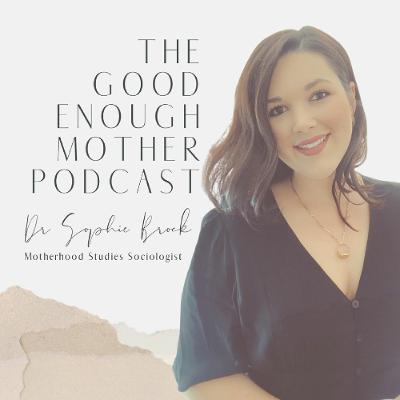
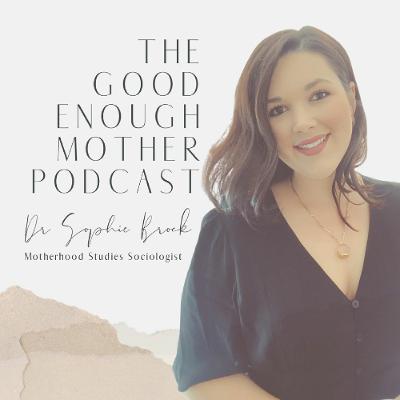
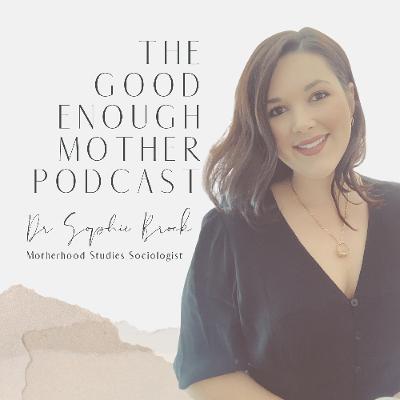

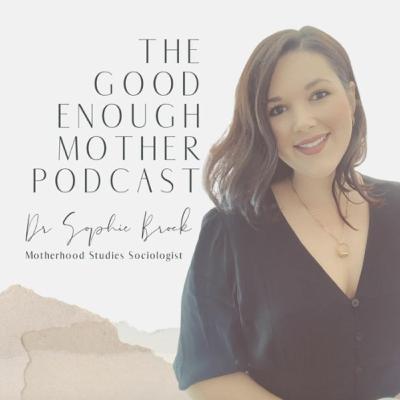
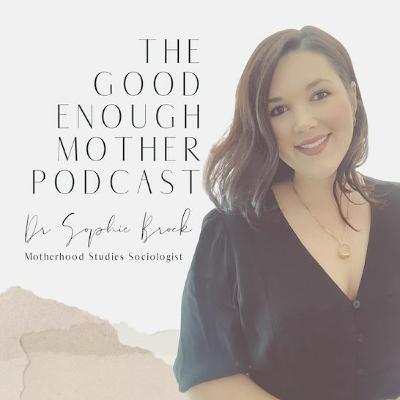

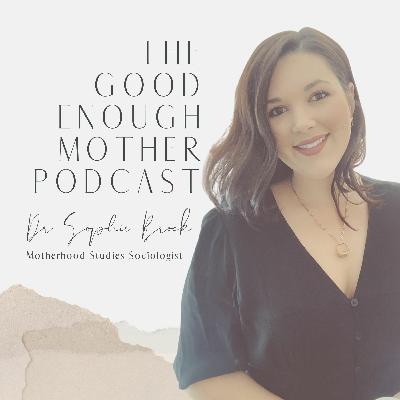
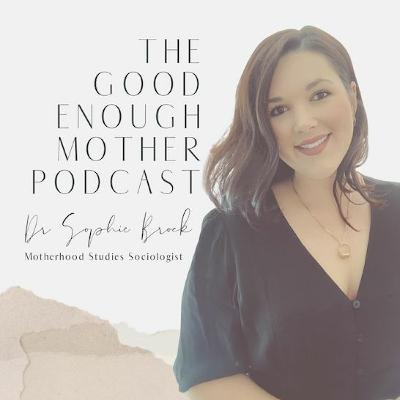



Thank you for this episode. ❤